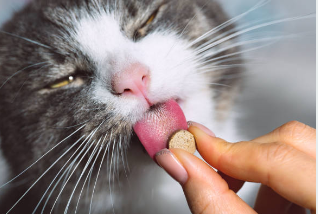Pregnant Dog: How to Protect Her from Ticks and Fleas
Ticks and fleas are common parasites affecting dogs of all ages, but they can be especially dangerous for pregnant dogs. Ticks and fleas can transmit diseases to pregnant dogs, such as Lyme disease, ehrlichiosis, and Rocky Mountain spotted fever. These diseases can cause serious health problems for the mother and her puppies, including miscarriage, stillbirth, and congenital disabilities.
It is essential to protect your pregnant dog from ticks and fleas. Here are some tips:
- Use a monthly tick and flea preventative. Several different tick and flea preventatives are available, both over-the-counter and prescription. Talk to your veterinarian about the best option for your dog.
- Check your dog for ticks and fleas regularly. Even if you use a tick and flea preventative, you must check your dog for ticks and fleas regularly, especially if she spends time outdoors.
- Remove any ticks or fleas that you find. If you find a tick on your dog, remove it immediately. To do this, use a tick removal tool to grasp the tick close to the dog’s skin and pull it straight up. Be careful not to twist or crush the tick, as this can release fluids that contain disease-causing organisms. If you find a flea on your dog, you can kill it using a flea comb or topical flea treatment.
- Keep your yard free of ticks and fleas. You can do several things to keep your yard free of ticks and fleas, such as mowing your lawn regularly, removing any leaf litter, and treating your yard with a tick and flea spray.
In addition to the above tips, there are several natural things you can do to help protect your pregnant dog from ticks and fleas. These include:
- Use a flea and tick spray made from essential oils. Many different flea and tick sprays are available with essential oils, such as cedarwood oil, lavender oil, and rosemary oil. These sprays are safe for pregnant dogs and can help repel ticks and fleas.
- Give your dog a bath with flea and tick shampoo. Many different flea and tick shampoos are available that can help kill and remove ticks and fleas from your dog’s coat. Be sure to read the label carefully and ensure the shampoo is safe for pregnant dogs.
- Use a flea and tick collar. Many different flea and tick collars are available that can help repel ticks and fleas. Be sure to read the label carefully and ensure the collar is safe for pregnant dogs.
It is important to note that no single method is 100% effective at preventing ticks and fleas. However, following the tips above can help reduce the risk of your pregnant dog becoming infested with these parasites.

Here are some additional tips for protecting your pregnant dog from ticks and fleas:
- Avoid areas where ticks and fleas are common. This includes tall grass, wooded areas, and areas with a lot of leaf litter.
- Keep your dog’s fur short. This will make it easier to find and remove any ticks or fleas.
- Scrutinize your dog after she has been outdoors. Please pay special attention to her ears, tail, and paws.
- Wash your dog’s bedding regularly. This will help to kill any ticks or fleas that may be hiding in her bedding.
Talk to your veterinarian if you have any concerns about your pregnant dog’s health. They can provide you with additional advice on how to protect your dog from ticks and fleas.
Here are some additional questions that you may have about pregnant dogs’ ticks and fleas:
-
Can pregnant dogs use tick and flea preventatives?
Yes, several tick and flea preventatives are safe for pregnant dogs. However, it is essential to talk to your veterinarian before using any tick and flea preventative, as some products may not be safe for pregnant dogs.
-
What are the signs of a tick infestation?
The most common sign of a tick infestation is the presence of ticks on your dog’s body. Other symptoms of a tick infestation include:
* Redness or swelling at the site of the tick bite
* Lethargy
* Loss of appetite
* Fever
* Lameness
* Pale gums
-
What are the signs of a flea infestation?
The most common signs of a flea infestation include:
* Scratching
* Chewing at the skin
* Hair loss
* Red bumps on the skin
* Fleas or flea dirt (black specks) in the fur
* Restlessness
If you are concerned about the health of your pregnant dog, I recommend that you consult with a veterinarian. They will be able to provide you with the best advice based on your dog’s individual needs.
However, here is some general information about how to treat ticks and fleas on a pregnant dog:
- Ticks: Ticks can carry several diseases, including Lyme disease and Rocky Mountain spotted fever. To remove a tick, use a tick removal tool or tweezers to grasp the tick as close to the dog’s skin as possible. Pull the tick straight out, careful not to twist or crush it. Once the tick is removed, clean the area with soap and water.
- Fleas: Fleas can cause dog problems, including itching, hair loss, and anemia. You can use a topical flea treatment, such as a flea collar or spot-on medication to treat fleas. You can also use an oral flea medication.
It is important to note that not all flea and tick treatments are safe for pregnant dogs. Be sure to talk to your veterinarian before using flea or tick treatment on your pregnant dog.
Here are some additional tips for treating ticks and fleas on a pregnant dog:
- Inspect your dog regularly for ticks and fleas. This is especially important if your dog spends time outdoors.
- Use a preventative flea and tick treatment. This will help to prevent your dog from getting ticks and fleas in the first place.
- Keep your home clean and free of fleas and ticks. This includes vacuuming regularly and washing your dog’s bedding.
- If you do find a tick on your dog, remove it immediately. Do not try to apply home remedies to remove the tick.
- If you are concerned about your pregnant dog’s health, consult a veterinarian. They will be able to provide you with the best advice based on your dog’s individual needs.


